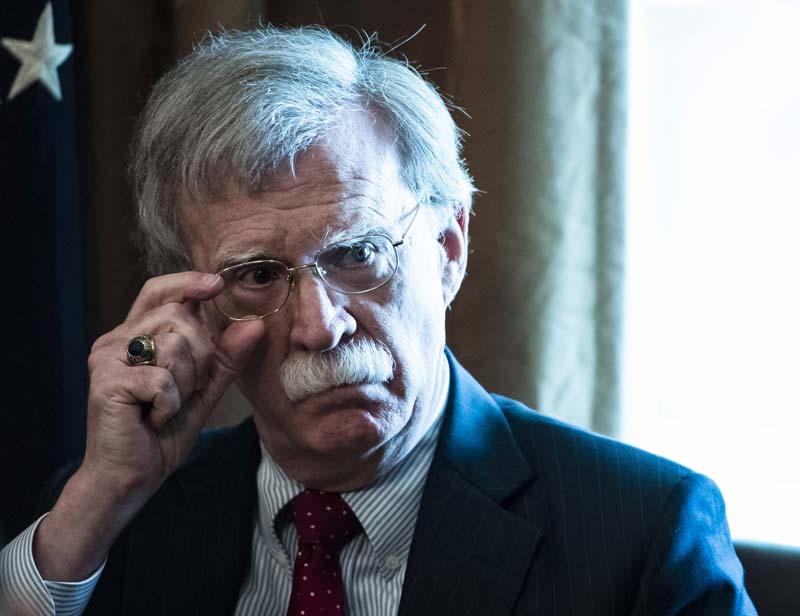 Jabin Botsford for The Washington Post
Jabin Botsford for The Washington Post
So while those predicting a sudden shift in American foreign policy are probably wrong, there's also no question that without the stubborn Bolton acting as a brake on the president's neo-isolationist “America First" instincts, the chances that Trump will continue to push for dramatic diplomatic breakthroughs on those fronts that are probably illusory will certainly increase.
The last straw for Trump was almost certainly the result of the fallout from the announcement that his proposed Camp David summit this weekend with leaders of the Taliban was cancelled. Trump, with the reported support of Secretary of State Mike Pompeo, was eager for some kind of an agreement about winding down U.S. participation in the war in Afghanistan. Bolton opposed the proposed deal with the Taliban and was rightly against the idea of hosting terrorists with American blood on their hands at Camp David to seal the agreement, especially just days after 9/11. Having the Taliban at the presidential retreat was a terrible idea, though the dramatic nature of the gesture apparently appealed to Trump.
The effort collapsed when Trump was finally persuaded that the Taliban wouldn't cease involvement in terrorism and couldn't be trusted to keep the peace in the wake of a U.S. withdrawal. The president deserved credit for having the guts to walk away from a bad deal, despite badly wanting to conclude a pact that would have allowed him to keep his promise to withdraw American troops from the country's longest war.
Yet reportedly, Trump couldn't stand Bolton taking credit for a decision that came with no gains and so finally got rid of him.
Bolton was a foreign-policy hawk who had little faith in efforts to appease regimes like that of North Korean, Venezuela and Iran. His willingness to advocate for threatening the use of U.S. force against Iran and other foes always put him at odds with a president who was elected by pledging to end American participation in Middle East wars, similar to the one Bolton advocated for during his time serving in the George W. Bush administration.
His departure will cause isolationists like Sen. Rand Paul (R-Kentucky) and Fox News Channel Host Tucker Carlson to celebrate. Carlson, in particular, has sought to push Trump to reject the advice of people like Bolton and Pompeo, both of whom have been strong advocates of a policy that puts maximum pressure on Tehran to renegotiate a bad nuclear deal, cease their support for terrorism and end to their quest for regional hegemony.
So the question now must be whether Bolton's departure leads to a significant shift in U.S. foreign policy, particularly towards Iran.
The reason why it has been so hard to predict Trump's intentions on this issue is that he has always been torn between his disdain for Obama's dangerous nuclear pact and his instinctive abhorrence for American involvement in overseas conflicts. The basic contradiction between these two impulses only seemed to be resolved in the last 18 months, once he put a foreign-policy team in place — in the form of Bolton and Pompeo, who agreed on getting tough with Iran and in solidifying the alliance with Israel. The U.S. withdrawal from the 2015 nuclear deal and the reimposition of devastating sanctions that have brought Iran's economy to its knees soon followed.
Still, having achieved so much, despite the opposition of the Democrats at home and America's feckless European allies abroad, Trump is now interested in talking with the Iranians.
That appalled Bolton, as it did Israeli Prime Minister Benjamin Netanyahu. Both of them believe that negotiations with Islamist dictators will never achieve a thing, and both fear that talks with Iran will inevitably lead to appeasement.
Yet Trump has faith in his negotiating skills and, as has been the case with his futile efforts at forging a relationship with North Korean dictator Kim Jong-un, thinks a meeting with Iranian President Hassan Rouhani later this month at the United Nations might start a negotiation that leads to a new and better nuclear deal.
In theory, such a meeting doesn't undermine the “maximum pressure" policy that Pompeo and Bolton have been implementing. Indeed, an Iranian realization that they must talk with the United States and make concessions was the goal of that policy, not a war that no one wants.
No harm will come from a meeting as long as the president and his team stand their ground on the nuclear and terrorism issues. Most importantly, they must not pay for a photo opportunity by lifting the sanctions that are backing the Iranians into a corner.
But with Bolton gone and the possibility that Pompeo will leave the State Department sometime in the next several months to run for a Senate seat in Kansas, there is a real chance that Trump will make some choices that will be disastrous, even though they may be perceived as good politics. He might choose to cut and run in Afghanistan — leaving its people to the tender mercies of the Taliban, who could once again allow the country to become a haven for terrorists — and agree to his own weak deal with Iran just to have a foreign-policy “success" that could aid his re-election campaign.
Though he might not have enjoyed working with Bolton, Trump benefited from his hard-boiled and realistic view of bad international actors. If the president chooses to listen instead to the voices urging him to undermine America's long-term security interests by abandoning its overseas responsibilities, then we may look back at this as the moment when Trump started to repeat some of Obama's mistakes in the Middle East.
Sign up for the daily JWR update. It's free. Just click here.
(COMMENT, BELOW)
Jonathan S. Tobin is editor in chief of Jewish News Service. He's been a JWR contributor since 1998.


 Contact The Editor
Contact The Editor
 Articles By This Author
Articles By This Author